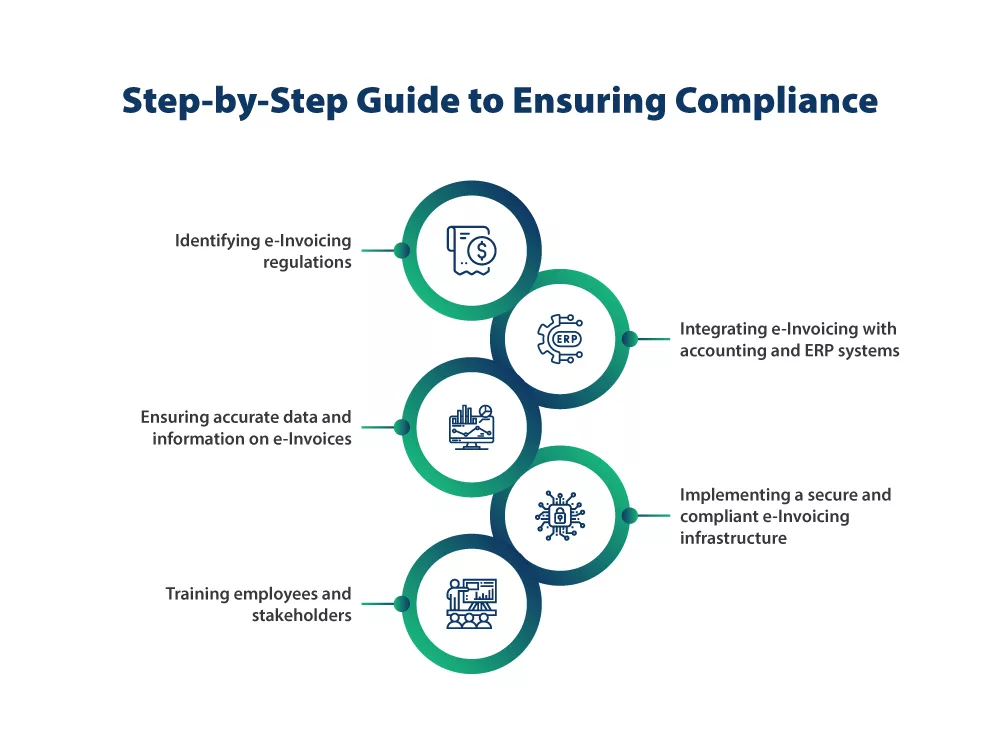In an era where technology continually transforms the way businesses operate, electronic invoicing, or e-Invoicing, has emerged as a critical facet of modern commerce. This innovative approach to invoicing has not only streamlined financial processes but has also prompted the establishment of comprehensive e-Invoicing regulations. In this blog, we will be delving into the intricacies of e-Invoicing regulations, providing businesses with a roadmap to seamlessly navigate through this dynamic landscape whilst ensuring compliance.
Introduction
e-Invoicing refers to the electronic creation, exchange, and processing of invoices (documents containing details of a transaction). Unlike traditional paper-based invoices, e-invoices are generated and shared digitally, usually in structured formats that allow for seamless integration with accounting and Enterprise Resource Planning (ERP) systems. This modern approach to invoicing offers numerous benefits, including enhanced efficiency, reduced errors, and improved transparency.
The rising adoption of e-Invoicing prompted governments and regulatory bodies around the world to establish e-Invoicing regulations to ensure standardized practices, data security, and tax compliance. These regulations define the mandatory elements of an e-invoice, specify data formats and standards, and set guidelines for secure electronic exchange. Adhering to these regulations not only ensures smooth business operations but also assists them in mitigating legal and financial risks.
Compliance with e-Invoicing regulations offers several advantages. It promotes accuracy in financial records, reduces the risk of errors, and enables seamless integration with accounting systems. Additionally, complying with e-Invoicing regulations can lead to improved relationships with trading partners, as it establishes trust and transparency in transactions. Furthermore, by adopting structured and standardized e-invoice formats, businesses can enhance their operational efficiency and reduce processing costs.
Core Component of e-Invoicing Regulations
Mandatory Information on E-Invoices
e-Invoicing regulations typically stipulate mandatory information that must be included in an e-invoice. This information often encompasses details about the supplier and recipient, invoice date, a unique invoice identifier, description of goods or services, quantities, prices, taxes, and payment terms. Compliance requires accurate and complete representation of this information in the e-invoice.
Benefits and Challenges of Complying with e-Invoicing Regulations
Advantages of e-Invoicing Compliance for Businesses
Beyond enhanced operational efficiency and reduced errors, compliant businesses can avoid penalties and legal repercussions otherwise resulting from non-compliance. Furthermore, standardized e-Invoicing processes improve relationships with trading partners and contribute to a positive business image.
Addressing the Obstacles and Costs of Implementation
Implementing e-Invoicing regulations can be challenging. Businesses may encounter obstacles such as adjusting to new technology, integrating e-Invoicing systems with existing ERP systems, and training employees. There are also extra costs associated with system upgrades, security measures, and ongoing monitoring.
Step-by-Step Guide to Ensuring Compliance

Identifying Applicable e-Invoicing Regulations
The first step toward compliance is understanding the e-Invoicing regulations that apply to a business. In India, businesses with an annual turnover of more than INR 5 crores must generate e-invoices for their transactions.
Integrating e-Invoicing with Accounting and ERP Systems
Integrating e-Invoicing systems with existing accounting and ERP systems is crucial for seamless operations. Businesses should next collaborate with IT departments to ensure compatibility and smooth data exchange between platforms.
Ensuring Accurate Data and Information on E-Invoices
Compliance hinges on accurate and complete data representation, so organizations should implement processes to verify and validate information before generating e-invoices. They must also regularly update product catalogs, pricing, and tax codes.
Implementing a Secure and Compliant e-Invoicing Infrastructure
Businesses can ensure the security and authenticity of e-invoices by implementing robust digital signature mechanisms, encryption protocols, and secure data storage practices. They need to regularly review and update security measures to successfully counter emerging threats.
Training Employees and Stakeholders
Educate employees and stakeholders on the nuances of e-Invoicing regulations and the proper use of e-Invoicing systems. Training sessions can enhance awareness, reduce errors, and foster a culture of compliance.
e-Invoicing Service Providers and Solutions
Evaluating e-Invoicing Service Providers
For businesses seeking external support, selecting the right e-Invoicing service provider is critical. They should evaluate providers based on their expertise, reputation, security measures, and ability to cater to specific compliance requirements.
Choosing the Right e-Invoicing Solution for Your Business
Depending on a business’s size and needs, they should choose an e-Invoicing solution that aligns with their compliance requirements. Some solutions offer customizable features and integration options to seamlessly fit into existing workflows.
Automating e-Invoicing Compliance
Artificial Intelligence (AI) and automation technologies can play a pivotal role in e-Invoicing compliance. These technologies can streamline data validation, enhance accuracy, and expedite the creation and exchange of e-invoices. While automation offers efficiency gains, businesses must carefully consider potential risks, such as system vulnerabilities, errors in automated processes, and the need for ongoing oversight.
Auditing and Monitoring e-Invoicing Compliance
Internal Audits for e-Invoicing Compliance
Regular internal audits help ensure ongoing compliance with e-Invoicing regulations. These audits can help businesses identify any gaps, inconsistencies, and areas for improvement in their compliance processes.
Dealing with Non-Compliance Issues
In the event of non-compliance, businesses should have a plan to address and rectify issues promptly. This may involve working closely with legal advisors and tax experts to mitigate potential penalties or consequences.
The Future of e-Invoicing Regulations
Anticipated Changes and Updates
As technology continues to evolve, e-Invoicing regulations are likely to undergo updates and refinement. Businesses must stay informed about these changes and proactively adapt their compliance strategies.
Preparing for Future Compliance Challenges
Being prepared for future compliance challenges involves building flexible e-Invoicing systems that can accommodate regulatory changes, harnessing emerging technologies, and cultivating a culture of continuous improvement.
FAQs: Addressing Common Queries on e-Invoicing Compliance
1: What is the difference between e-Invoicing and Electronic Invoicing?
e-Invoicing specifically refers to the exchange of invoices in structured digital formats, whereas electronic invoicing encompasses any form of invoice sent electronically, including PDFs (Portable Document Format).
2: Do all businesses need to comply with e-Invoicing regulations?
The businesses having turnover above the specified threshold need to comply with the e-Invoicing mandate.
3: Can e-Invoicing help reduce tax-related complications?
Yes, compliant e-Invoicing processes can reduce tax-related complications by ensuring accurate reporting, proper documentation, and transparent transactions that align with tax regulations.
In conclusion, mastering e-Invoicing regulations is an essential aspect of modern business operations. By understanding the intricacies of these regulations, integrating compliant systems, and nurturing a culture of continuous improvement, businesses can not only ensure smooth operations over the long term but also harness the advantages of efficiency, accuracy, and transparency that e-Invoicing offers.
